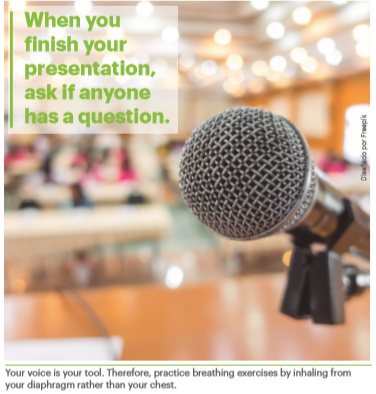How to improve your public speaking skills
Do you usually feel nervous when it comes to speaking in public, in either your native or second language? Don’t worry! Nervousness is okay. The best way to get over it is to prepare and feel confident about what you will say. In this article, we would like to give you some tips that, if you practice them, will help guarantee your success when speaking in public.
Your body language speaks for you more than you think. It is giving a message to the audience
Let’s start with what a good public speaker reflects in their stage presence: confidence, friendliness, enthusiasm, and energy. First of all, remember two things that might seem simple but, that in reality, are not that easy for most of the people: body language and voice control. Your body language speaks for you more than you think. It is giving a message to the audience. We recommend you to relax when you are standing in an upright position and to be aware of your facial expressions.
Your voice is your tool. Therefore, practice breathing exercises by inhaling from your diaphragm rather than your chest. By doing this, you will improve the tone, pitch, and volume of your voice. For some people, the hardest part is “how can I start?”. According to Forbes, it can be effective to start your presentation with a strong “grabber”, such as a story, a quote related to your topic, or rhetorical questions. Nonetheless, you must remember that throughout your speech you should talk with the intent to encourage people to take action. Remember that “speech is power: speech is to persuade, to convert, to compel” (Ralph Waldo Emerson).
On the other hand, when delivering your message, it is crucial that your audience does not get lost. To ensure this, avoid filler sounds like “eh” and “mmm”; vary the pitch of your voice to grab more interest. Pronounce words correctly; pause between ideas, and speak in a normal way (not too slow, not too fast).

Acknowledging your audience is another important part of starting your presentation. If you find it helpful, you can encourage them to participate with you and have a conversation. In this way, you can generate more interaction and genuine interest in your topic. Smiling, nodding, and finding friendly faces will make you feel more comfortable. Nonetheless, try not to focus on people who are making rude gestures or “heckling”.
When you finish your presentation, ask if anyone has a question. Then, the moment you arrive home and have time for yourself, think back about performance and make notes and plans about how you could do even better next time.

